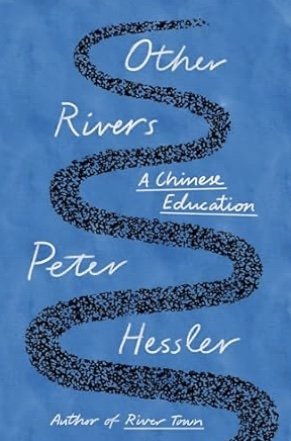Other Rivers by Peter Hessler (Penguin Press)
Of all the books I’ve read about the Covid years, whether they are fiction or memoirs, there’s only one I would ever reread. This is one that was written in 2020, Wuhan Diary by the sixty-five-year-old author, Fang Fang (Asia By the Book, December 2020). First published online from January to March of 2020, then translated into more than twenty languages, including English, and published by HarperCollins, this journal showed the day-by-day progression of the virus and the means by which it was suppressed, described in deeply human terms. For me, nothing else has measured up to Fang Fang’s reportage, for which she has been almost erased. She is no longer published in China and her name can no longer appear in that country’s press, nor can she be interviewed by any outlet. Despite this silencing, she remains hopeful, telling another writer, “I believe it won’t be like this forever.”
In his latest book, Other Rivers, Peter Hessler fails to reach the standard set by Fang Fang, although he was also living in China at the time she published her writing. A man who first came to China in 1996, Hessler has lived and worked in that country for over ten years. In the autumn of 2019, he returned with his wife (Leslie Chang, author of Factory Girls, who has matched her husband’s duration in China) and their nine-year-old twin daughters.
Hired by Sichuan University in Chengdu, Hessler is greeted with a sardonic observation. Noting that he came to work in Cairo just as the 2011 Arab Spring with its subsequent massacres began and then returned to the US when Trump win the 2016 election, a writer at a dinner party predicts that with Hessler’s return to China, “something bad is probably going to happen.” Within three months, Covid erupts in Wuhan.
As a journalist, Hessler had a stunning opportunity to bring this time to life and at times he does that. His account of his daughters’ introduction to Chengdu Experimental Primary Elementary School where they are the only foreign students and the only ones who have no knowledge of the Chinese language, is fascinating, although given less attention than it might have received. The interruption that Covid imposes is perhaps partially to blame but the girls have a full year in the school after that. At the end of the book, Hessler admits his children’s time in a Chinese public school was the most challenging part of our time in Chengdu,” something a reader would never guess from his accounts of that “challenge.”
To be fair, he has a few challenges of his own, ones that are prompted by what seems a lot like naivete. Since English language classics are available in Chengdu, there are a wide assortment of books from which to choose, so it seems peculiar that Animal Farm is one of the two texts chosen for his class on English Composition. Instead of glossing over Orwell’s political satire, Hessler teaches it in tandem with 1984, a recipe for disaster.
In his nonfiction class, he decides to turn its center-point to journalism, sending his students out into the city to observe and report. When one of his students does a profile on her VPN dealer, Hessler identifies this as “edgy research,” but then has her read it out loud in front of the class. “I wasn’t sure if Yidi’s subject matter was too sensitive,” he says, “...by the time she was halfway finished, I was convinced that I had put her at risk.” Considering his “over ten years” in China, this seems negligent to the point of stupidity.
Later, when Wuhan is no longer under lockdown, Hessler visits and interviews Fang Fang, although this is forbidden. But why worry? By the time this is published, he’s back in the US. At the end of March, 2021, his request for a contract renewal is denied by Sichuan University and he and his family return to the peace of rural Colorado.
A writer without a selectivity index, Hessler has no ability to focus. Everything he has ever seen or experienced he tosses in a gigantic salad, recounted in a random fashion that is painfully staccato. His return to the city and the students that he depicted in his first book, River Town, is thrown into his time in Chengdu, no doubt in an effort to increase the page count in Other Rivers. Although he achieves over 400 pages, at least half of them could have been cut to make this a better book, presenting an inevitable question. Where was his editor? ~Janet Brown
